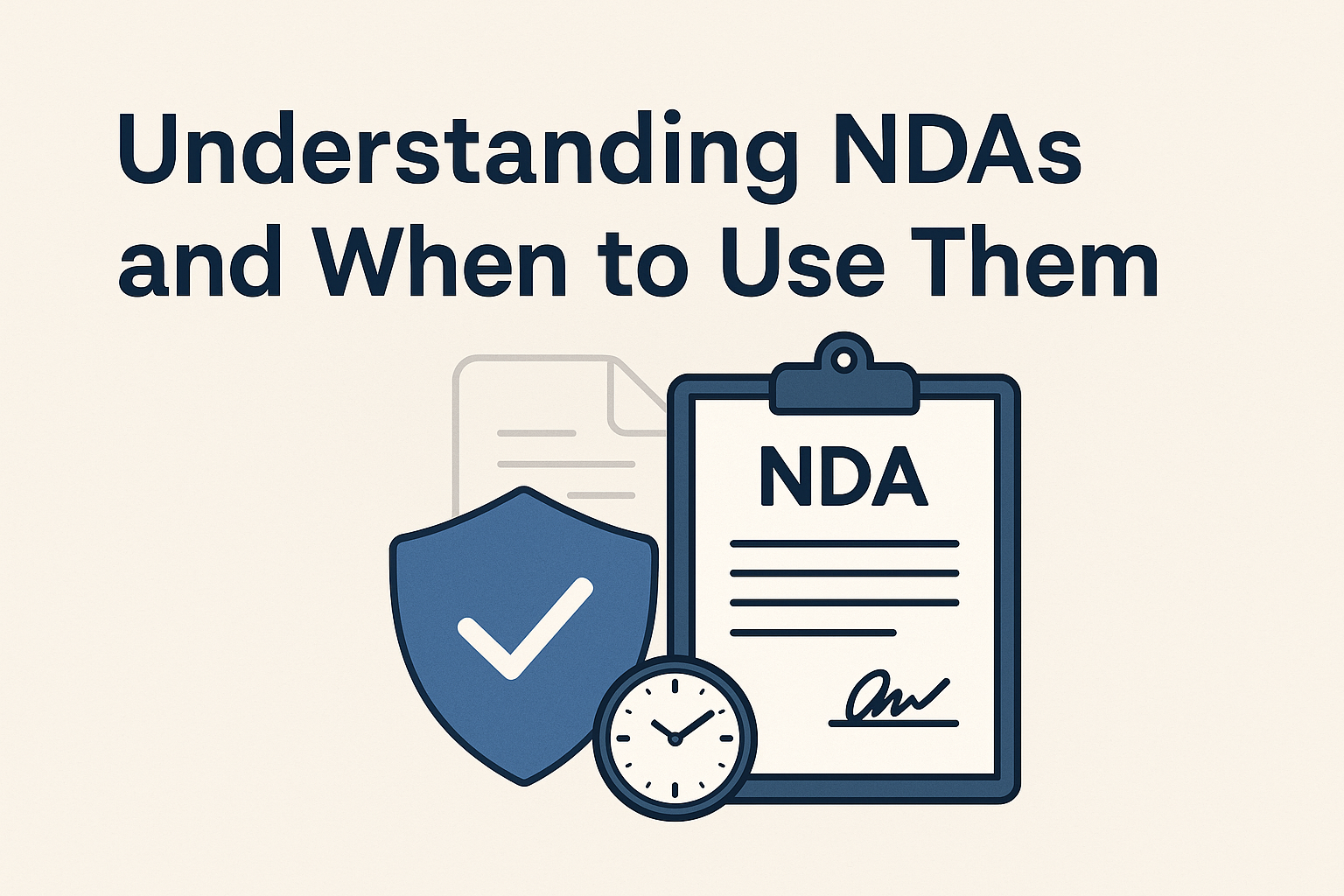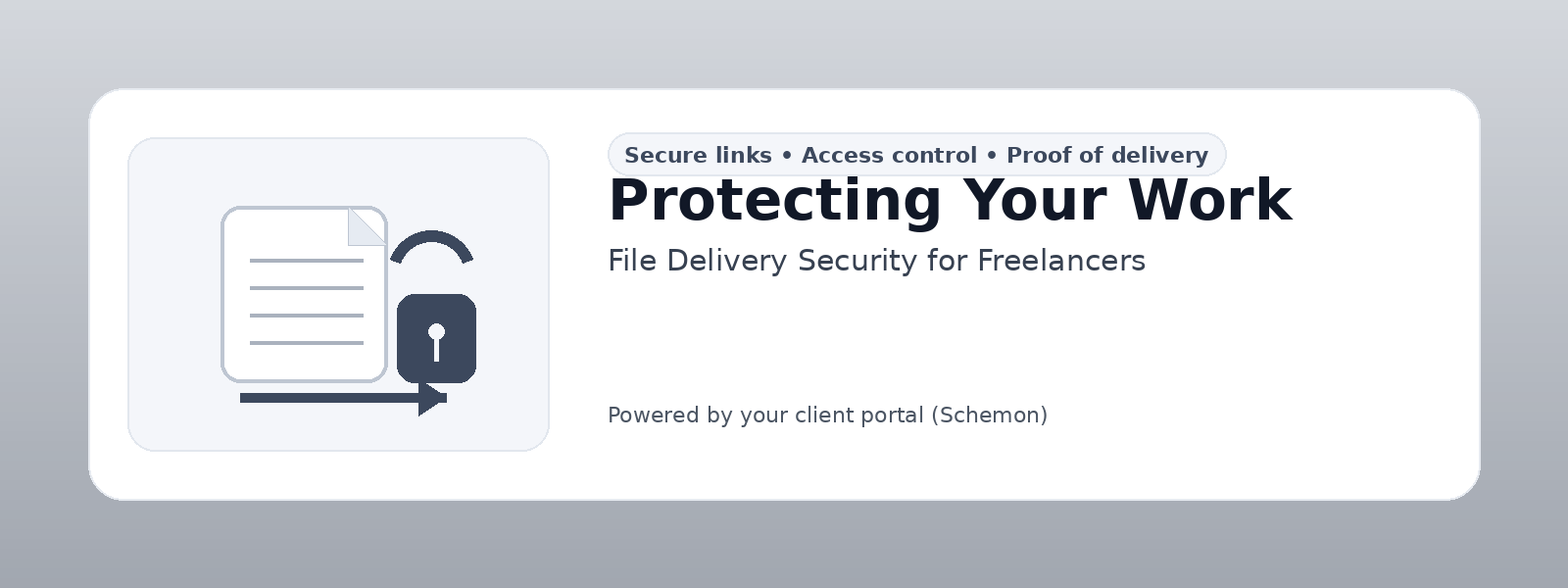


A Freelancer’s Guide to Confidentiality, Trust, and Legal Protection
You’ve landed a new client. They’re sharing sensitive materials, business plans, or a pre-launch product idea—and suddenly they mention an NDA.
Or maybe you’re the one wanting to protect your process or intellectual property.
If you’re wondering, “Do I really need to sign (or ask for) an NDA?” — you’re not alone.
In this post, we’ll break down:
- What NDAs (Non-Disclosure Agreements) actually are
- When freelancers should use or request them
- What to look for before signing
- How tools like Schemon support timestamped, trackable NDA sharing
Let’s help you work with confidence—without the legal guesswork.
What Is an NDA?
An NDA, or Non-Disclosure Agreement, is a legal contract that protects confidential information shared between two parties.
It ensures that:
- You don’t share or misuse sensitive details from the client
- Or the client doesn’t leak or misuse your confidential materials (in mutual NDAs)
Think of it as a formal promise of silence and security—common in professional, high-trust freelance relationships.
When Freelancers Might Be Asked to Sign an NDA
Here are common freelance scenarios where clients may request an NDA:
- Early-stage startups sharing unreleased product plans
- Corporate clients involving proprietary data
- Agencies hiring ghostwriters or white-label contributors
- Brands working on confidential ad campaigns
- Legal, finance, or health-sector projects (HIPAA, GDPR, etc.)
Tip: Read every NDA carefully before signing. Not all NDAs are equal—and some may include overly broad language that could limit your future work.
When Freelancers Should Request an NDA
You can also request an NDA if:
- You’re sharing your proprietary process during discovery
- You’re pitching a unique concept or draft before payment
- You’re submitting materials to collaborators before a formal agreement
Even if you trust a client, a signed NDA adds a layer of professionalism and clarity.
Bonus: Clients often take freelancers more seriously when an NDA is part of their onboarding process.
Why Timestamped NDA Delivery Matters
In a legal dispute, it’s not just about what was shared—it’s about when.
That’s why tools that timestamp your NDA deliveries and file shares offer powerful legal protection.
For example:
- If a client claims they never saw your NDA
- If you’re accused of leaking a concept you received under NDA
- If you want to prove you sent your NDA before a project started
You’ll need a verifiable delivery trail—not just an email attachment.
How Schemon Helps You Share NDAs Professionally
Schemon is a premium freelance platform that not only handles bookings, messaging, and payments—it also allows you to upload and send NDAs or contracts securely.
“As Schemon is a premium platform that helps you send files as well, your NDAs will be timestamped.”
That means:
- Clients receive your NDA as part of your onboarding process
- Each upload is date-stamped, logged, and stored securely
- You can track when it was sent, opened, or acknowledged
It’s like having a digital paper trail, without extra admin.
Should You Always Use an NDA?
Not always. NDAs are useful in high-trust, high-risk situations—but they’re not always necessary for:
- Public work (like writing blog posts or creating social content)
- Low-budget, short-term gigs
- Clients who are transparent about their use of shared data
That said, it’s better to be overprepared than under-protected—especially when intellectual property is involved.
Quick Freelancer NDA Checklist
Before you sign (or send) an NDA:
1) Read every line and check for:
- Duration
- Scope of confidentiality
- Penalties for breach
- Mutual vs. one-sided terms
2) Ask questions if unsure
3) Store a signed digital copy securely
4) Log the send/receive date (automatically handled via Schemon)
Final Thoughts: Work Smarter, Not Scarier
NDAs aren’t about distrust—they’re about clarity, boundaries, and professionalism.
As a freelancer, having an NDA process shows you take confidentiality seriously—and that builds trust with premium clients.
When you pair that with a tool like Schemon, you don’t just look organized. You are organized.
“Schemon helps you send NDAs, collect bookings, share files, and track everything—so your business runs smoother, safer, and smarter.”
Want to streamline your NDA and client onboarding process?
Create your free Schemon profile today and take control of your freelance workflow.
👉 Try Schemon now →











